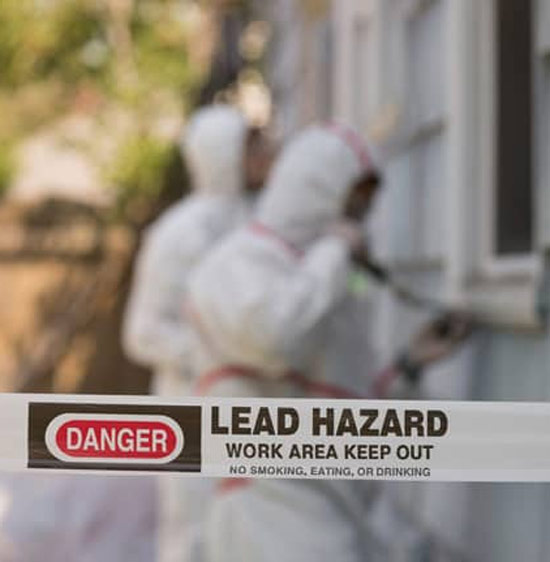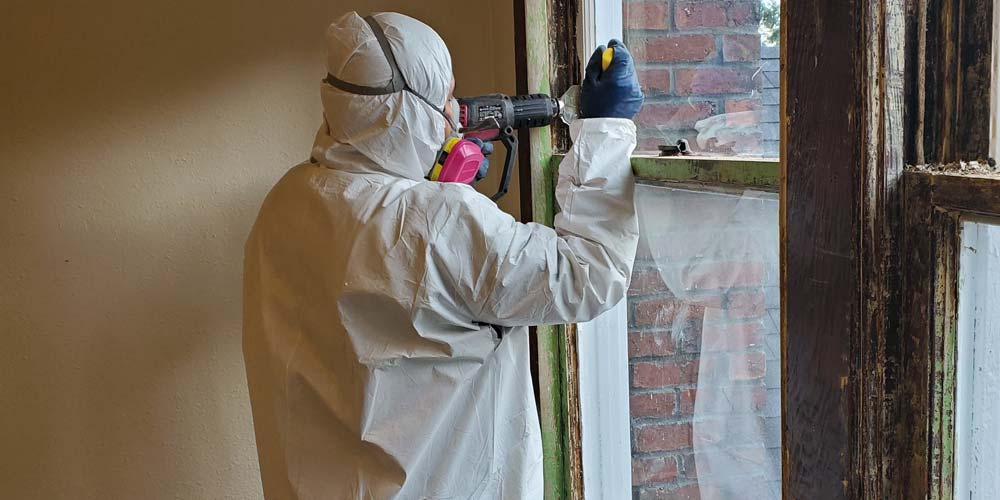NYC Lead Paint Removal Company-- Ensuring Safe and Legal Conformity
NYC Lead Paint Removal Company-- Ensuring Safe and Legal Conformity
Blog Article
Comprehensive Overview on Effective Lead Offense Elimination Techniques
In the realm of ecological security, addressing lead offenses demands a thorough and organized method. This comprehensive overview begins by highlighting the important preliminary actions of determining lead threats with advanced analysis and testing techniques. The guide clarifies on the importance of adhering to rigorous security methods during the elimination process, consisting of the usage of appropriate PPE and separating affected areas.
Determining Lead Threats
Recognizing lead hazards is a crucial very first step in reducing the dangers connected with lead direct exposure. Lead, a poisonous metal, can be present in numerous environmental mediums, including paint, dirt, water, and dirt.
The first stage in recognizing lead threats entails understanding common lead resources within the constructed setting. Frameworks built before 1978 are particularly susceptible due to the widespread use lead-based paint throughout that period. Furthermore, soil contamination can occur from weakening exterior paint, industrial exhausts, or historic use leaded gasoline.
Another substantial source is lead piping and plumbing components, which can seep lead into drinking water. Customer items such as toys, ceramics, and imported items may also contain harmful lead degrees. Significantly, work environments and leisure activities including lead can track contaminants right into homes.
Analysis and Testing
When resolving lead risks, effective evaluation and screening are critical. First assessment normally involves a visual examination to recognize prospective lead resources, such as deteriorating paint or polluted dirt.

Dust clean tasting is an additional critical method, particularly in residential settings. By gathering samples from floors, windowsills, and various other surfaces, this method offers insights right into prospective direct exposure threats. Moreover, dirt testing around building boundaries is crucial to spot lead contamination that could position threats, specifically to children.
Safe Elimination Treatments
Upon finishing complete evaluation and testing, carrying out secure elimination procedures is the next critical stage in resolving lead threats. This procedure guarantees that lead-contaminated materials are effectively and securely gotten rid of, lessening danger to both workers and homeowners. The primary step involves separating the afflicted area using plastic bed linen and appropriate sealing strategies to stop the spread of lead dust.
Employees need to don suitable personal safety devices (PPE), including respirators, handwear covers, and disposable coveralls, to mitigate direct exposure. Employing specialized devices and damp approaches, such as damp sanding or using HEPA-filtered vacuum cleaners, reduces the diffusion of lead particles. It is crucial to prevent completely dry sanding or unpleasant blasting, as these approaches can produce harmful lead dust.
Garbage disposal is one more essential element; all infected materials have to be securely gotten and labeled according to EPA and regional regulations. Furthermore, thorough cleaning of the workspace with HEPA vacuum cleaners and wet cleaning ensures the removal of recurring lead fragments.
Post-Removal Verification

Confirmation of effective lead elimination, called post-removal confirmation, is imperative to guarantee the safety and security and habitability of the remediated location. This process involves a series of careful analyses and tests created to identify any residual lead particles that may present wellness threats. The first step typically includes a visual evaluation to evaluate the conclusion and high quality of the removal work. This assessment makes sure that all well-known resources of lead have actually been addressed and that no noticeable indicators of contamination remain.
Following the visual examination, ecological tasting is carried out. This includes collecting dust, dirt, and occasionally water examples from the remediated area. Accredited laboratories assess these examples to determine lead degrees, guaranteeing they top article fall below the safety and security limits established by regulatory bodies such as the Environmental Protection Firm (EPA)
On top of that, air high quality screening may be performed to detect air-borne lead bits, especially in instances where substantial lead-based paint removal or improvement has actually happened. The results of these examinations offer quantitative information confirming that the lead degrees are within acceptable restrictions.
Eventually, post-removal verification functions as an important checkpoint, try this out verifying the performance of the lead abatement initiatives and protecting the health of passengers and visitors.
Precautionary Measures and Upkeep

An essential preventative step consists of making use of lead-safe accredited service providers for any kind of restoration, repair work, or painting activities. These professionals are learnt techniques that lessen lead dirt and particles. In addition, keeping colored surfaces to prevent chipping or peeling off is crucial, as wearing away paint can launch lead bits into the my review here environment.
Educational efforts targeting homeowner and renters relating to the dangers of lead and the significance of reporting any prospective dangers can further boost precautionary efforts. Routine cleansing making use of HEPA vacuum cleaners and wet wiping techniques can considerably minimize lead dirt build-up.
Final Thought
In summary, effective lead infraction elimination requires a precise technique incorporating thorough analysis, specific screening, and rigorous elimination procedures. Making sure safety through proper isolation and personal protective tools remains extremely important. Post-removal confirmation through ecological tasting and air high quality testing corroborates conformity with well-known safety requirements. Recurring assessments and maintenance are vital to reduce future lead threats, thus protecting public health and wellness and making sure sustained conformity with regulatory needs.
Report this page